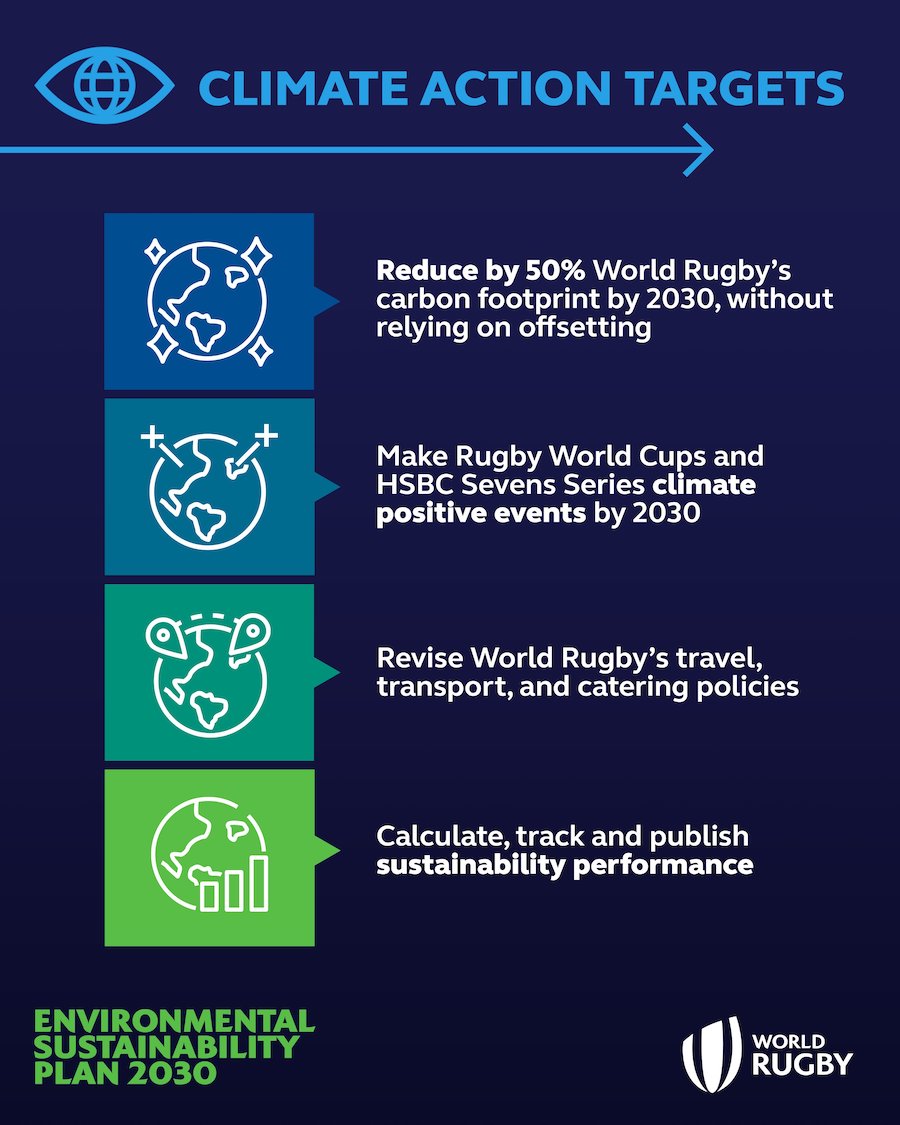
World Rugby launches ambitious plan to support global action on climate change
January 21, 2022
On Wednesday, World Rugby released its ambitious Environmental Sustainability Plan (ESP) 2030 - a detailed strategy to help tackle the environmental sustainability issues that both affect and are affected by rugby.
The sport's governing body states that it has been an "active and committed advocate of positive change" for over 20 years, noting that it was one of the first international federations to sign the United Nations Sport for Climate Action Framework (UNFCCC) in 2019.
With the climate crisis worsening and affecting rugby communities around the world, and aligned to its values of solidarity and respect, the organization was further motivated to develop a comprehensive environmental sustainability plan. Its ‘Global Sport for All’ Strategic Plan 2021-25 sets specific targets to achieve over the next decade, including cutting waste, carbon emissions by 50% by 2030 without using offsetting and other environmental impacts.
"Storms, floods, fires and drought attributed to global warming are devastating communities, while the low-lying Pacific Islands in particular are among the most vulnerable communities on earth to the impact of climate change due to the rise in sea levels that is compromising their very existence. Without immediate and meaningful action, the rugby family will be amongst all other groups, communities and ecosystems affected globally," World Rugby stated in a release.

Chairman Sir Bill Beaumont said: “The climate crisis is arguably the biggest challenge facing humanity and our planet’s fragile ecosystems. It is affecting all areas of our lives and with it, our ability to play the sport we love.
“Although the climate and environmental impact of rugby and all its associated activities are relatively minor compared with other sectors, it is our moral responsibility to be strong advocates for environmental and social responsibility and show leadership through accountability, positive action and good governance.
Over the last year, the federation worked with leading sport and sustainability experts to understand and assess areas of greatest impact, need and influence. The resulting ESP 2030 aims to provide a roadmap for tackling the sport’s impact on the global environment and promoting best practices. Included in its targets are plans to ensure all World Rugby competitions have a positive impact on the natural environment by 2025. The plan has been backed by leading rugby figures and International Rugby Players alongside external sport and sustainability experts from the IOC, United Nations and others.
World Rugby’s ESP 2030 focuses on three themes:
- Climate action: addressing the carbon footprint of rugby, adaptation measures to stay in line with the 2015 Paris Agreement and use rugby’s platform to spread awareness and advocate for climate action
- Circular economy (managing materials and resources): addressing issues of single-use plastic, short-life materials and waste management
- Natural environment protection: addressing how rugby can help sustain ecosystems and promote healthier environments wherever it is played
With these new targets, World Rugby has completed the requirements set by the UNFCCC to become a signatory of the “Race to Zero”, a global campaign to rally leadership and support from businesses, cities, regions and investors for a healthy, resilient, zero carbon recovery that prevents future threats, creates decent jobs and unlocks inclusive, sustainable growth. All Race to Zero signatories are committed to the same overarching goal: halving emissions by 2030 and achieving net zero emissions by 2040 or earlier.